
The National Pep - A History
by Professor Julius Pavel
|
National Pep history is not an easy thing to write about. The band themselves are reluctant to discuss exactly where and when the band started or even the relationship between the current line-up and its predecessors. The earliest reference I have found is an invoice presented by "The National Pep Choral Quartet" presented to the manager of the Arcadia Hotel in Santa Monica, CA. The date on the invoice is August 31st 1897. The only other point of interest is that the breakdown of the fees awards 90% of the sum to "O. Blumenfeld", the remaining 10% to be shared out among the other three. |
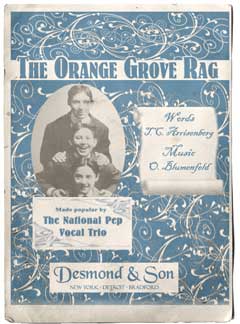 |
Their origins aside, "The National Pep Vocal Trio" (as they became) first came to fame with the song 'Orange Grove Rag' in 1903. The popularity of the number was due in no small part to the trio's stage act which culminated in the dancer Josephine Millovicz emerging from a barrel of oranges (on those nights that she didn't pass out from asphyxia). Their inability to persuade her to become a permanent part of the act was a great loss to the troupe due to her ability to keep the audience amused on those occasions that the performance of the others fell below acceptable standards. Given the reaction of American audiences, it became inevitable that the group would eventually set sail for Europe and the next stage in the band's development can be traced to a performance in the English town of Chumleigh. It is rumoured that at least one of the band's members at this time was originally from England, so perhaps this concert was a homecoming. |
Despite having been performers of sentimental ballads in the United States, the group that arrived in England proclaimed itself to be on the vanguard of a new and shocking musical form: "Jas". Their performance was hailed as being "quite unlike any music heard in these isles before, even that of other visiting jass performers".>
|
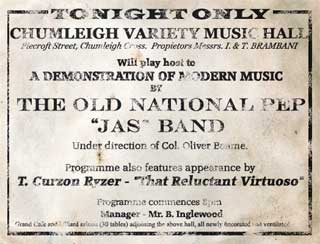 |
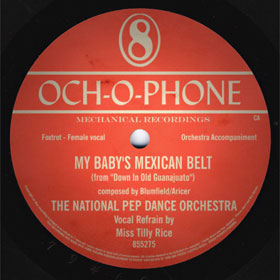 |
It is the group's next move that perhaps highlights a tension between the members as to the direction they should take. Having been embraced by the European avant-garde, there was talk that the group would unveil a "jazz opera" based on the novel 'Venus In Furs'. The oppurtunity to anticipate The Velvet Underground by 40 years was lost as more commercial and Americanophile forces within the band prevailed. The project was edited and polished and what Olwyn Bland, the band leader, had once announced as "an uncompromsing look at pyscho-sexual fetishes with many scandalous references to activities south-of-the-border" finally opened on Broadway as a musical about the adventures of an all-American leather-goods salesman and his innocent adventures in Mexico. As safe as the work was, it did spawn the hit 'My Baby's Mexican Belt' which was later resurrected by a lineup of "The National Pep Hot-Cha Five" during the band's time as a postmodern hot jazz revivalist outfit in the early 60s. |
| As many artists did, the group parlayed their Broadway success into an opportunity to move west to California and court the major movie studios. The most well known example of their time in the Golden State was 'The Hollywood Song Of 1933'. The band's presence in the movie can be confirmed by the opening titles, but sadly, only the first reel of the movie survives and their performance seems to be lost forever. | 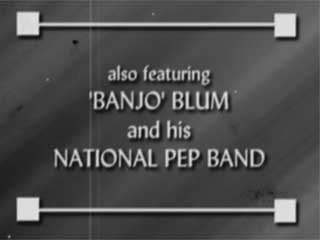 |
I'm
awaiting a delivery of certain documents that detail the band's activities
in the 40s, 50s and 60s. When I have them I'll fill in that part of
the story. If I don't get them soon, a few Ebay sellers are going to
get some negative feedback. |
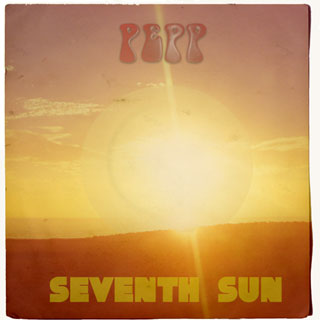 |
The 70s didn't seem to agree with band. There is little to be said about the 1973 album "Seventh Sun" as the attempt to cram longer songs on the groove-cutting limitations of a vinyl record have rendered nearly all survivng copies unplayable. Rumours persist of a double-vinyl version released in Holland, I'd be eager to hear from anyone owning a copy. The Pepp debacle was followed some years later by the misconcieved TV variety show "The Pep Stars and Larry", which featured awkwardly performed comedy sketches, uncomfortable guest stars and charisma-free host Larry Fellowes. The show was mercifully cancelled after five and a quarter episodes. |
If the 70s had seen the band stymied by attempts to try something new, the 80s saw them return to a small measure of success by jumping on every bandwagon going. Every other week, it seemed, Smash Hits would featured Ollee sporting a new haircut and every other month they'd come out with a new song that sounded suspiciously like last month's biggest selling group. It was only after the collapse of their record label that they found a new voice in the burgeoning "indie" scene of the late 80s. |
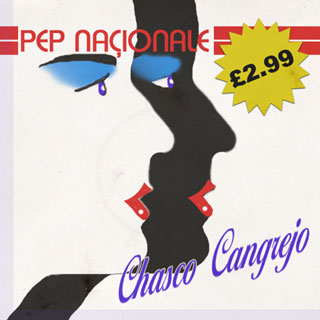 |
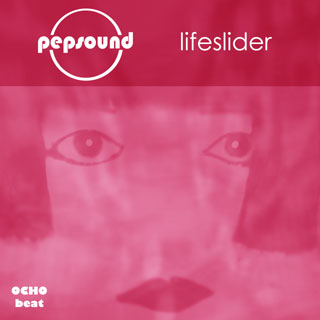 |
It is a puzzle why, when the alternative fed more and more into the mainstream in the early 90s, the band then chose to vanish. Britpop came and went without any attempt by the group to join or resist the movement. A musical legacy of over 100 years was silenced. The middle of the first decade of the 21st Century saw no particular focus dominate the music scene. Innovation and imitation plateaued and almost everything was fashionable to somebody. It was in this confused landscape that, to no fanfare, rehearsal rooms were booked under the name The National Pep and some almost familiar names made up the membership. What this means for the future of music remains to be seen. |
People We Like Mailing List The Band's History
Message Board MySpace Page
Blog
page design by Sociotechnical Cybernetic Research Associates of Manchester. Images by Mapcase of Anaheim. Some rights reserved. Try self-pity, it's cheaper.